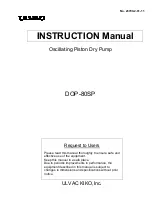
10
www.imo.se
AC
F/
U
C
F5 2
01
9.
12 e
n-
G
B
, I
D
-N
o.
: 1
63
-0
44
/B
IMO AB
Fig. 15 Filling the pump
Fig. 17 Direction of rotation
Fig. 16 Deaeration plugs
ACG
ACF
ACE
Deaeration plug
Deaeration plug
Deaeration plugs
Deaeration plug
LPQ
Start-up
For pumps in explosion-hazard areas
(→ ATEX additional instructions).
Before starting
After installation and whenever it can be assumed
that the pump has been emptied, the pump must be
thoroughly filled with liquid. See fig 15.
For ACE Generation 3, LPE Generation 3, ACG
Generation 7 and ACF Generation 4 delivered after
1997, ACF Generation 5 and LPQ the pumps have
been fitted with deaeration plugs making venting of
the shaft seal compartment easy before start-up.
In installations with positive suction pressure: After
opening the inlet and outlet valves, simply open the
deaeration plug a few turns until oil sips out. Tighten
the plug.
In installation with negative suction pressure: After
opening the inlet and outlet valves, remove the
deaeration plug and fill the shaft seal compartment
with oil. Fit and tighten the plug. See fig. 16.
Note: for LPQ the amount of oil is appr 50 liter.
!
Make sure the prime mover is locked out
and can not be started accidentally.
Rotate the shaft by hand while filling the pump, to
ensure that the rotor bores and the shaft seal cavity
is filled. On the smaller pumps: (LPD, ACD, ACE,
LPE, ACG/UCG), this is done by rotating the fan on
the electric motor after removing the fan cover.
! Do not forget to fit the motor fan cover
again before making start of motor
possible.
On the ACF/UCF and LPQ pumps, the pump can
be turned using the shaft coupling. If the suction
pipe cannot be completely filled, it is important to
ensure that the trapped air is evacuated without any
pressure build up. (See fig. 8 Deaeration).
ATTENTION
Starting a dry pump is likely to cause
damage, especially to the shaft seal.
Direction of rotation
When the pump is ready to be started, switch the
motor briefly on and off and check that the drive
motor rotates in the correct direction as indicated by
the rotation arrow.
The arrow is placed on different spots depending on
the pump series.
www.northridgepumps.com










































